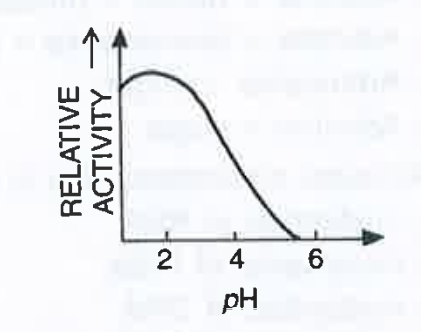Assertion. Enzymes becomes inactive below minimum temperature.
Reason. The inactivity of the enzymes is due to denaturation.
Both Assertion and Reason are true and Reason is the correct explanation of Assertion
Both Assertion and Reason are true, but Reason is not the correct explanation of Assertion
Assertion is true but Reason is false
Both Assertion and Reason are false
The correct Answer is:C
To analyze the assertion and reason provided in the question, we can break it down step by step.
1. Understanding the Assertion:
- The assertion states that "Enzymes become inactive below minimum temperature."
- This means that there is a specific temperature threshold below which enzymes do not function effectively.
2. Understanding the Reason:
- The reason states that "The inactivity of the enzymes is due to denaturation."
- Denaturation refers to the structural alteration of proteins (including enzymes) that leads to a loss of their functional properties.
3. Analyzing Enzyme Activity:
- Enzymes have an optimum temperature at which they function best. Below this temperature, the kinetic energy of the enzyme and substrate molecules decreases, leading to fewer collisions and slower reaction rates.
- If the temperature drops significantly below the optimum, enzymes may not be able to catalyze reactions effectively, leading to inactivity.
4. Denaturation and Temperature:
- Denaturation typically occurs at high temperatures, where the enzyme's structure is disrupted. However, at low temperatures, enzymes do not denature but rather become less active due to reduced molecular motion.
- The assertion is correct in stating that enzymes become inactive at low temperatures, but the reason provided is misleading. Inactivity at low temperatures is not due to denaturation; rather, it is due to decreased kinetic energy and reduced interaction between enzyme and substrate.
5. Conclusion:
- The assertion is true, but the reason provided is not a correct explanation for the assertion. Therefore, while both statements are true, the reason does not accurately explain the assertion.
Final Answer:
- The assertion is true, but the reason is not a correct explanation for the assertion.
- The assertion states that "Enzymes become inactive below minimum temperature."
- This means that there is a specific temperature threshold below which enzymes do not function effectively.
- The reason states that "The inactivity of the enzymes is due to denaturation."
- Denaturation refers to the structural alteration of proteins (including enzymes) that leads to a loss of their functional properties.
- Enzymes have an optimum temperature at which they function best. Below this temperature, the kinetic energy of the enzyme and substrate molecules decreases, leading to fewer collisions and slower reaction rates.
- If the temperature drops significantly below the optimum, enzymes may not be able to catalyze reactions effectively, leading to inactivity.
- Denaturation typically occurs at high temperatures, where the enzyme's structure is disrupted. However, at low temperatures, enzymes do not denature but rather become less active due to reduced molecular motion.
- The assertion is correct in stating that enzymes become inactive at low temperatures, but the reason provided is misleading. Inactivity at low temperatures is not due to denaturation; rather, it is due to decreased kinetic energy and reduced interaction between enzyme and substrate.
- The assertion is true, but the reason provided is not a correct explanation for the assertion. Therefore, while both statements are true, the reason does not accurately explain the assertion.
- The assertion is true, but the reason is not a correct explanation for the assertion.
Similar Questions
Knowledge Check
The activity of an enzyme becomes ineffective
Aat low temperatureBat atmospheric pressureCat high temperatureDin aqueous medium
Assertion : Enzymes become denatured at high temperature .
Reason : the tertiary structure of proteins gets damaged at high temperature .
View SolutionWhat is the influence of temperature on enzyme activity?
View SolutionOptimum temperature is the temperature at which an enzyme
View SolutionName the inactive enzymes present in pancreatic juice
View SolutionAll enzymes get denatured at high temperature.
View SolutionEnzyme which become more active in aged person is
View SolutionThe enzyme depicted in the below graph is

View Solution
